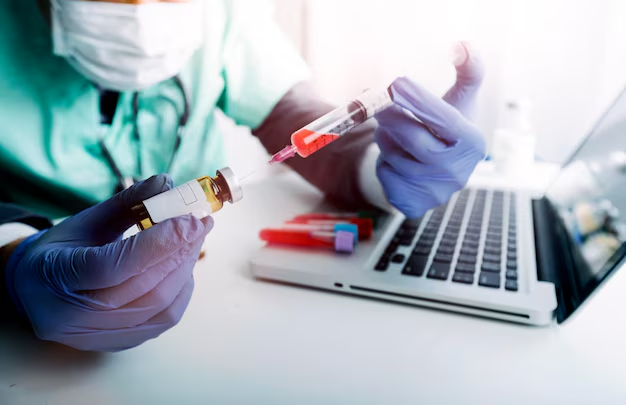Understanding Blood Test Results: Potential Indicators of Lymphoma
When faced with the uncertainty of potential cancer diagnosis, understanding the role of blood tests and what they signify can be empowering. One question many individuals have is: What blood test results might indicate the presence of lymphoma? While a blood test alone cannot diagnose lymphoma, certain blood findings can point to the possibility of this disease, signaling the need for further investigation. Let’s explore the aspects of blood tests that can serve as indicators, providing clarity and guidance for readers concerned about lymphoma.
The Basics of Lymphoma
Lymphoma is a type of cancer that originates in the lymphatic system, which is part of the body's germ-fighting network. It includes Hodgkin lymphoma and non-Hodgkin lymphoma, both characterized by the abnormal growth of lymphocytes, a type of white blood cell. While blood tests aren't definitive for diagnosing lymphoma, they play a crucial role in prompting additional tests if abnormal results arise.
Blood Tests and Their Role in Indicating Lymphoma
Complete Blood Count (CBC)
A Complete Blood Count (CBC) is a standard blood test often used to evaluate overall health and detect a variety of disorders, including lymphoma. While the CBC cannot diagnose lymphoma, it can reveal clues such as:
White Blood Cells (WBC): Lymphoma may cause abnormally high or low white blood cell counts. Elevated WBC levels could suggest the body is fighting an infection or, in some cases, a proliferation of abnormal lymphocytes.
Red Blood Cells (RBC) and Hemoglobin: Anemia, or low levels of RBC and hemoglobin, might occur in lymphoma patients due to bleeding or the body's inability to produce enough healthy blood cells.
Platelets: Lymphoma can affect bone marrow function, sometimes resulting in low platelet counts, impacting blood clotting.
Lactate Dehydrogenase (LDH)
Lactate Dehydrogenase (LDH) is an enzyme measured in blood to help evaluate lymphoma presence and progression. Elevated LDH levels can indicate tissue damage or tumor burden, serving as a marker of fast-growing cancers like lymphoma.
Erythrocyte Sedimentation Rate (ESR) and C-reactive Protein (CRP)
Markers of inflammation, such as the Erythrocyte Sedimentation Rate (ESR) and C-reactive Protein (CRP), are sometimes elevated in lymphoma cases, reflecting the body’s inflammatory response to cancer or infection.
Beta-2 Microglobulin
Beta-2 Microglobulin levels can be particularly insightful. Often assessed through blood tests, higher levels might indicate a larger tumor burden and serve as a marker for the aggressiveness of lymphoma.
Insights Beyond Standard Blood Tests
Bone Marrow Biopsy
While not a blood test, it's worth mentioning the relevance of a bone marrow biopsy in the context of lymphoma. This procedure helps ascertain if lymphoma has spread to the bone marrow, providing critical information not typically available through blood tests.
Flow Cytometry
Flow Cytometry is a specialized laboratory test used to examine the characteristics of cells in a blood sample. It's instrumental in identifying abnormal lymphocytes and confirming a lymphoma diagnosis when complemented with other tests.
Blood Test Limitations and the Need for Comprehensive Diagnosis
While blood tests can hint at lymphoma, they aren't sufficient for a conclusive diagnosis. Often, additional tests like imaging (CT, MRI, PET scans) and lymph node biopsies are necessary. It’s essential for individuals to understand that these tests guide physicians towards more detailed investigations rather than serving as a standalone diagnostic tool.
The Bigger Picture: Symptoms and Physical Examination
Understanding the combination of blood test results and physical examination findings provides a clearer picture for potential lymphoma concerns. Key symptoms, when coupled with abnormal blood findings, reinforce the need for a comprehensive evaluation:
- Enlarged Lymph Nodes: Usually painless swelling in areas such as the neck, armpits, or groin.
- Unexplained Weight Loss: Significant and unexplained weight loss over a short period.
- Fever and Night Sweats: Persistent fever and severe night sweats are symptomatic concerns.
- Fatigue: Unrelenting fatigue that doesn’t improve with rest.
Practical Tips for Patients
Preparing for a Blood Test
- Be Informed: Ask your healthcare provider about the purpose of each test.
- Health History: Share your complete medical history, including symptoms and family history, with your doctor.
- Fasting or Other Preparations: Some blood tests may require fasting; confirm instructions with your healthcare provider beforehand.
After Receiving Results
- Clarify with Experts: Discuss any abnormal results with your healthcare provider to understand potential implications.
- Follow-Up Tests: Be prepared for additional testing if initial blood test results suggest concern.
- Stay Proactive: Keep track of symptoms and any notable changes in your health, reporting these to your doctor promptly.
Conclusion: Empower Yourself with Knowledge
Blood tests can be an intimidating aspect of the diagnostic journey, especially when navigating concerns about serious conditions like lymphoma. Remember, while blood tests can indicate potential lymphoma, they are just one part of a broader diagnostic strategy. Staying informed, seeking clarity from healthcare professionals, and understanding the significance of test results are all crucial steps in empowered health management.
Key Takeaways 📝
- CBC Insights: Look for irregular white blood cell counts, anemia, or low platelets.
- Marker Awareness: Elevated LDH and Beta-2 Microglobulin levels can indicate lymphoma presence.
- Symptom Monitoring: Be vigilant about swollen lymph nodes, weight changes, and persistent fatigue.
- Comprehensive Approach: Rely on a suite of tests and consults for conclusive diagnosis.
- Healthcare Interaction: Communicate openly with providers about test results and next steps for clarity and peace of mind.

